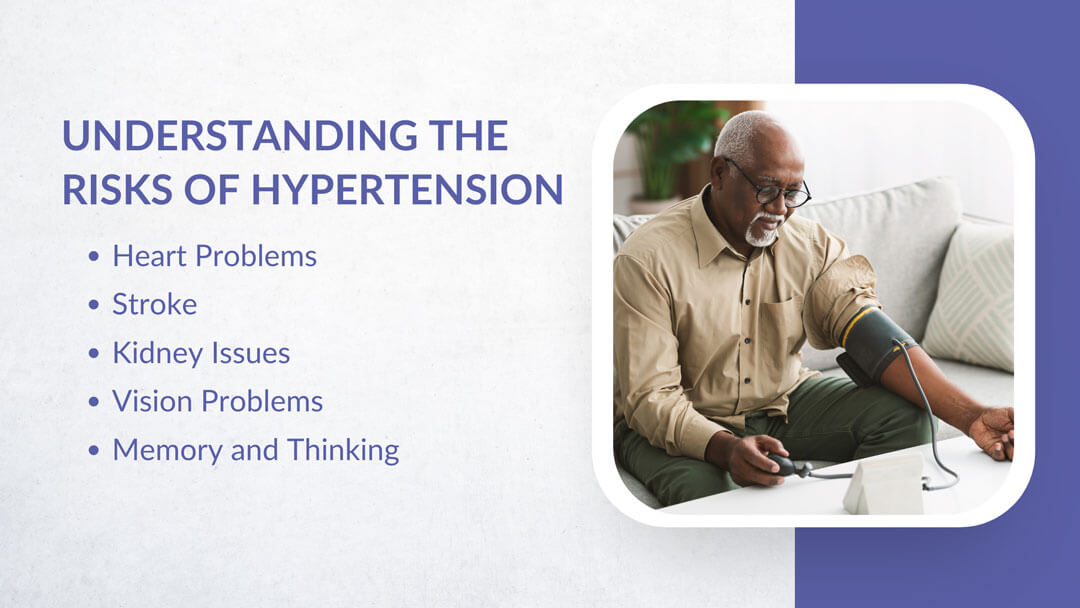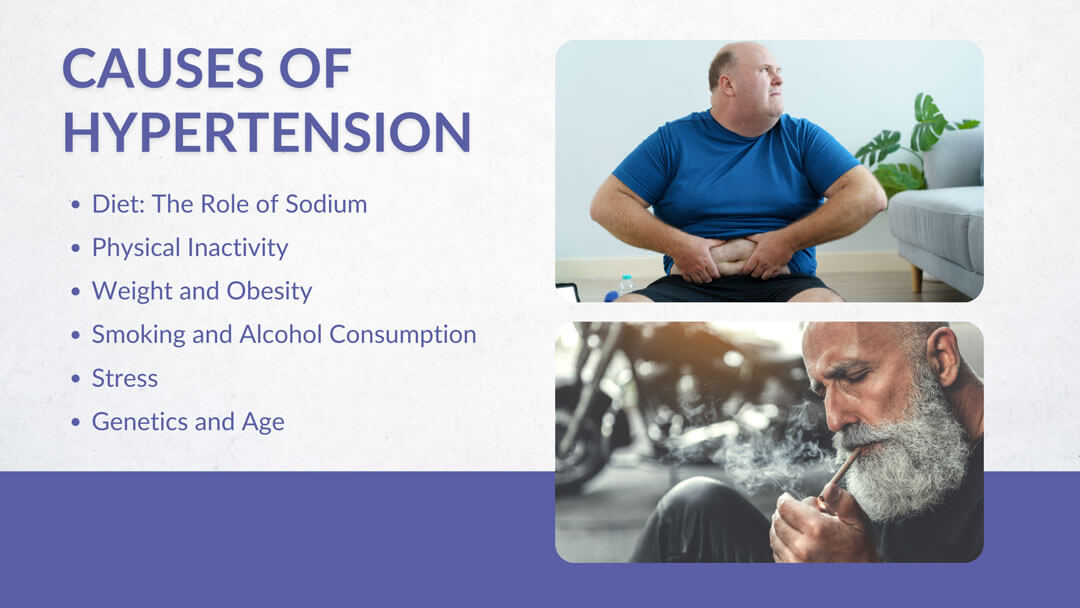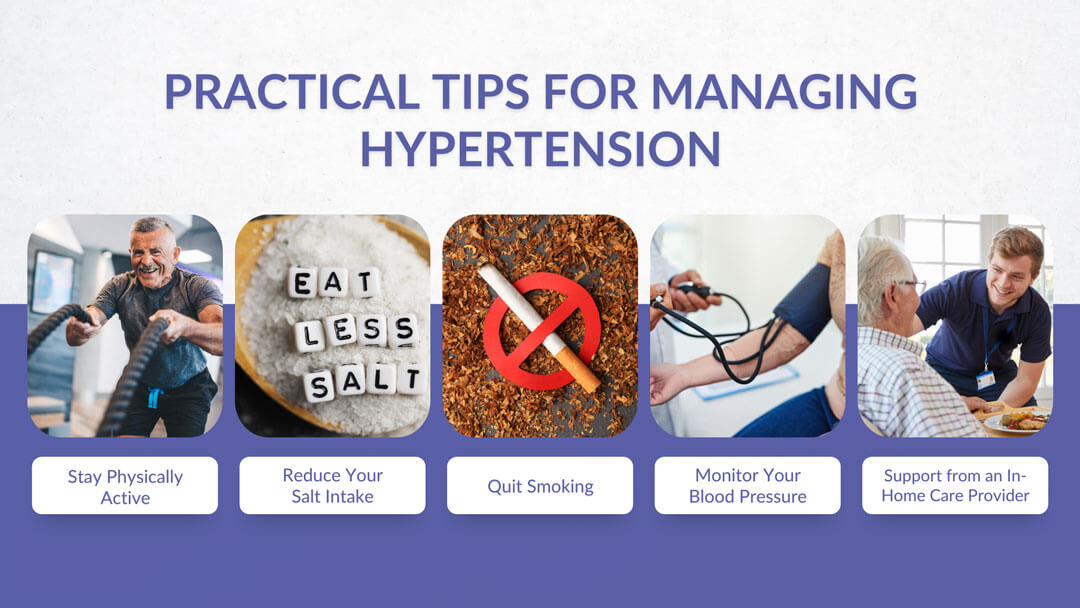Heart Health: Tips for Managing Hypertension

As we age, prioritizing heart health becomes increasingly important. One major concern is hypertension, commonly known as high blood pressure, a condition where the force of blood against artery walls is consistently too high. Without proper management, hypertension can lead to severe health issues such as heart attacks, strokes, kidney problems, and vision loss.
Table of Contents
Hypertension: The Silent Threat
Often called the “silent killer,” high blood pressure can go unnoticed until it causes significant damage. Regular blood pressure monitoring is essential for early detection and management. Consistently high readings at or above 130/80 indicate hypertension. While medications can help manage it, lifestyle changes are crucial for keeping blood pressure under control.
Understanding the Risks of Hypertension

High blood pressure, or hypertension, can lead to several serious health issues, especially as we get older. Let’s break down how it affects different parts of our health.
Heart Problems
When your blood pressure is high, it puts extra pressure on your arteries. Over time, this can make them harden and thicken, making it harder for blood to flow to your heart. Your heart then has to work harder, which can lead to chest pain, heart attacks, and even heart failure. In heart failure, your heart can’t pump enough blood, leading to tiredness, shortness of breath, and swelling in your legs and feet.
Stroke
High blood pressure is a major cause of strokes. Strokes happen when the blood supply to part of the brain is cut off. This can occur if high blood pressure causes the arteries leading to the brain to narrow or get blocked, often by a clot. It can also happen if high blood pressure causes a blood vessel in the brain to burst, leading to bleeding. Both types of strokes can cause serious disability or even be fatal, making it crucial to keep blood pressure under control.
Kidney Issues
Your kidneys filter waste from your blood using tiny blood vessels. High blood pressure can damage these vessels, making it hard for your kidneys to do their job. Over time, this damage can lead to chronic kidney disease, where harmful substances build up in your body. In severe cases, this can progress to kidney failure, which might require dialysis or a transplant.
Vision Problems
High blood pressure can damage the blood vessels in your eyes, leading to hypertensive retinopathy. This can cause blurry vision or, in severe cases, cause the retina to detach, leading to permanent vision loss if not treated quickly. Long-term high blood pressure can even lead to blindness.
Memory and Thinking
There’s increasing evidence that high blood pressure can affect your brain. It can reduce blood flow to your brain, depriving it of oxygen and nutrients. It can also cause small strokes that might not be noticed initially but can add up over time and cause damage. Some studies suggest that high blood pressure might also speed up the development of Alzheimer’s disease.
Why It’s Important to Manage High Blood Pressure
Understanding these risks shows why it’s so important to manage high blood pressure through both medication and lifestyle changes. Your doctor can prescribe medicines to help control your blood pressure, but changing your daily life is just as crucial. This includes eating a healthy diet with less salt and more fruits and vegetables, getting regular exercise, maintaining a healthy weight, quitting smoking, and finding ways to manage stress, like through relaxation techniques.
Causes of Hypertension

Hypertension develops when the force of blood against your artery walls is consistently too high. Understanding the contributing factors can help in managing and preventing it:
Diet: The Role of Sodium
High sodium intake is a significant risk factor. Sodium causes the body to retain fluid, increasing blood volume and pressure. Processed foods and restaurant meals often contain high levels of sodium. Reducing sodium by choosing fresh foods and cooking at home can lower blood pressure.
Physical Inactivity
Lack of exercise can lead to weight gain, putting extra strain on the heart. Regular physical activity helps maintain healthy blood vessels and improve blood flow. Aim for at least 30 minutes of moderate exercise most days of the week.
Weight and Obesity
Excess weight increases the blood volume your heart must pump, raising blood pressure. Losing even a small amount of weight can improve heart health.
Smoking and Alcohol Consumption
Smoking constricts blood vessels and raises blood pressure, while excessive alcohol consumption can also elevate blood pressure. Quitting smoking and limiting alcohol intake are essential for managing hypertension.
Stress
Chronic stress can increase blood pressure temporarily and promote unhealthy coping mechanisms like overeating and smoking. Managing stress through relaxation techniques and healthy lifestyle choices can help lower blood pressure.
Genetics and Age
Genetics and aging play significant roles in hypertension development. Family history and age-related changes in blood vessel elasticity can increase risk. Regular monitoring and healthy lifestyle choices are crucial.
Practical Tips for Managing Hypertension

Incorporating lifestyle changes can significantly improve health and control hypertension:
Stay Physically Active: Aim for at least 30 minutes of moderate activity five days a week. Activities like walking, jogging, biking, swimming, or joining a dance class can help. Combine cardio and strength training for optimal results. Consult your doctor for personalized exercise recommendations.
Reduce Your Salt Intake: Keep sodium intake around 1,500 mg or less daily. Read food labels and avoid processed foods. Opt for a well-balanced diet consisting of fresh fruits, vegetables, lean meats, and whole grains. Use herbs and spices instead of salt for flavor.
Quit Smoking: Quitting smoking can significantly benefit your health. Nicotine constricts blood vessels, making the heart work harder. Combined with high blood pressure, smoking raises the risk of stroke or heart attack.
Monitor Your Blood Pressure: Regularly check your blood pressure and track your readings. Note activities, stress levels, and other factors that might affect your readings. Share this information with your doctor.
Support from an In-Home Care Provider
An in-home care provider can be invaluable in managing your heart health. They can remind you to take your medication, help create and prepare a low-sodium diet, and encourage regular physical activity. Additionally, having a caregiver provides companionship and support as you navigate these lifestyle changes. Contact Always Best Care of Irvine at (949) 403-6099 to learn more and schedule your free consultation.





